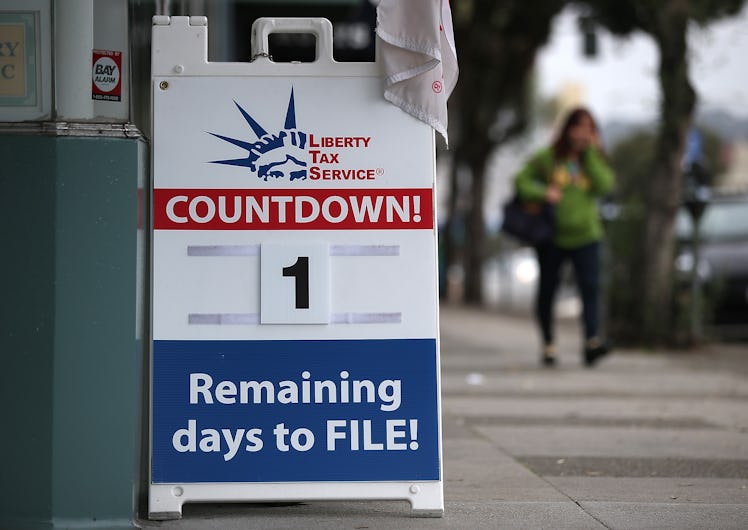
If You File Your Taxes Later, Get Ready To Pay Up
A simple fact of life is that some among us, year after year, no matter what, will wait until the last minute to file their tax returns. It's understandable — given that filing taxes can be a chore, even with the added incentive of a possible refund check — but it's also risky. If a person goes past simply filing last minute, and veers in filing altogether, then they'll find out what happens if you file taxes late: penalties.
At least, that's what the Internal Revenue Service (IRS) says it will impose in the case of late filing.
Here's how the federal agency's website describes its policy: "By law, the IRS may assess penalties to taxpayers for both failing to file a tax return and for failing to pay taxes they owe by the deadline." The site goes on to say that, "A failure-to-file penalty may apply if you did not file by the tax filing deadline. A failure-to-pay penalty may apply if you did not pay all of the taxes you owe by the tax filing deadline."
Here, the IRS makes a distinction for two infringements that might be easy to get mixed up. First, for those who owe taxes, is the failure to file, which is simply not submitting a tax return by the deadline at all.
The penalty for this infraction is 5 percent of the taxes a late filer owes, for each month (or part of a month) that a filer is later by.
Then there's the second infraction, the failure to pay, which can apply for even those who did submit their taxes on time.
For instance, if you filed your tax return for the 2017 calendar year on April 18 — the filing deadline for the 2018 tax season — but months later you still didn't pay the monetary amount on any of the taxes you owed the government after filing, you're liable to be hit with a penalty.
"If you do not pay your taxes by the tax deadline, you normally will face a failure-to-pay penalty of [one half] of 1 percent of your unpaid taxes," the IRS' website says. "That penalty applies for each month or part of a month after the due date and starts accruing the day after the tax-filing due date."
Fortunately for those who do file late, however, the IRS is willing to make exceptions. Late filers can apply for a first-time penalty abatement waiver, which is meant to forgive one-time offenders of the tax deadline.
Here's how the IRS describes it's "FTA" policy:
You may qualify for administrative relief from penalties for failing to file a tax return, pay on time, and/or to deposit taxes when due under the Service's First Time Penalty Abatement policy if the following are true: You didn’t previously have to file a return or you have no penalties for the 3 tax years prior to the tax year in which you received a penalty. You filed all currently required returns or filed an extension of time to file. You have paid, or arranged to pay, any tax due.
In addition, there are a number of appeals a late filer can make to the IRS, to avoid paying a penalty.
In a 2016 interview with USA Today, Cari Weston, director of taxation at the American Institute of CPAs, told the paper that there are a number of common excuses the IRS is likely to accept. Among those excuses are those that fall under fear of the IRS, health issues, mourning or burglary, according to Weston.
All in all, if you run past the tax deadline without actually paying any taxes owed, you could be hit with a fine. But with a little dialogue with the IRS, that fine can be avoided.